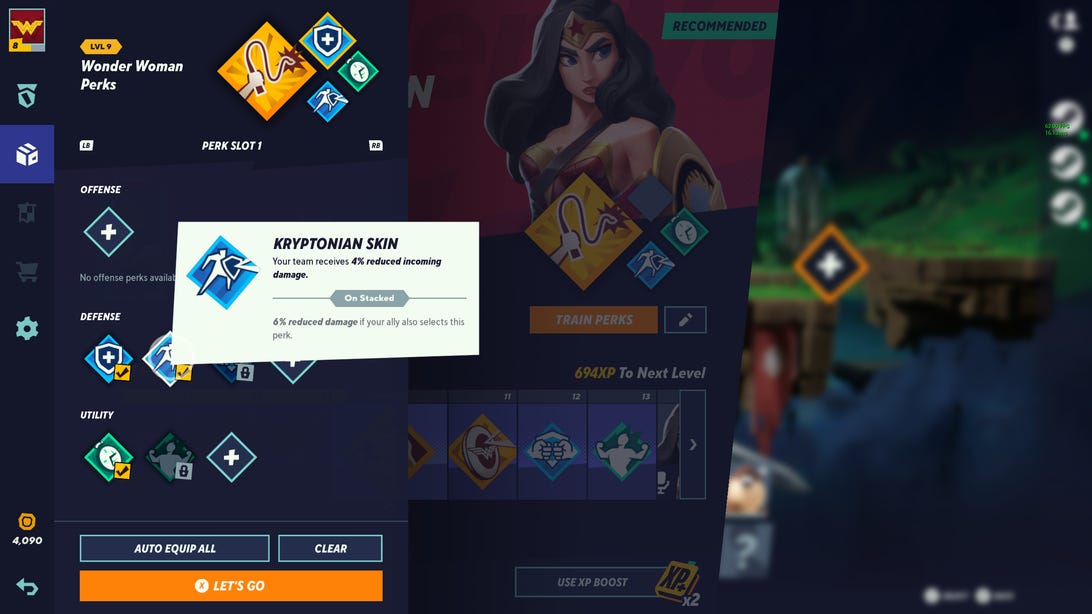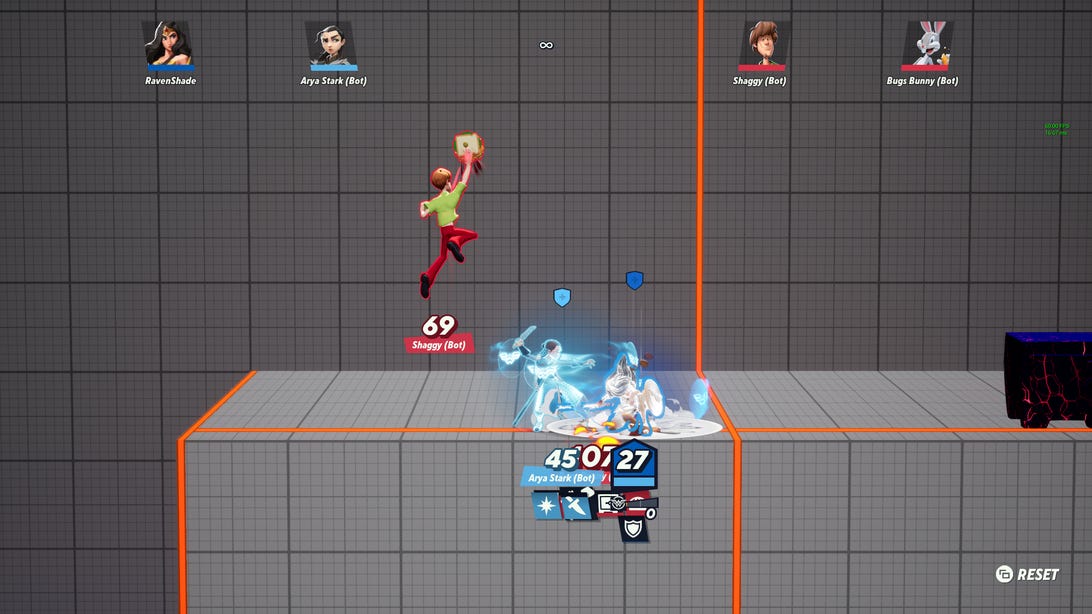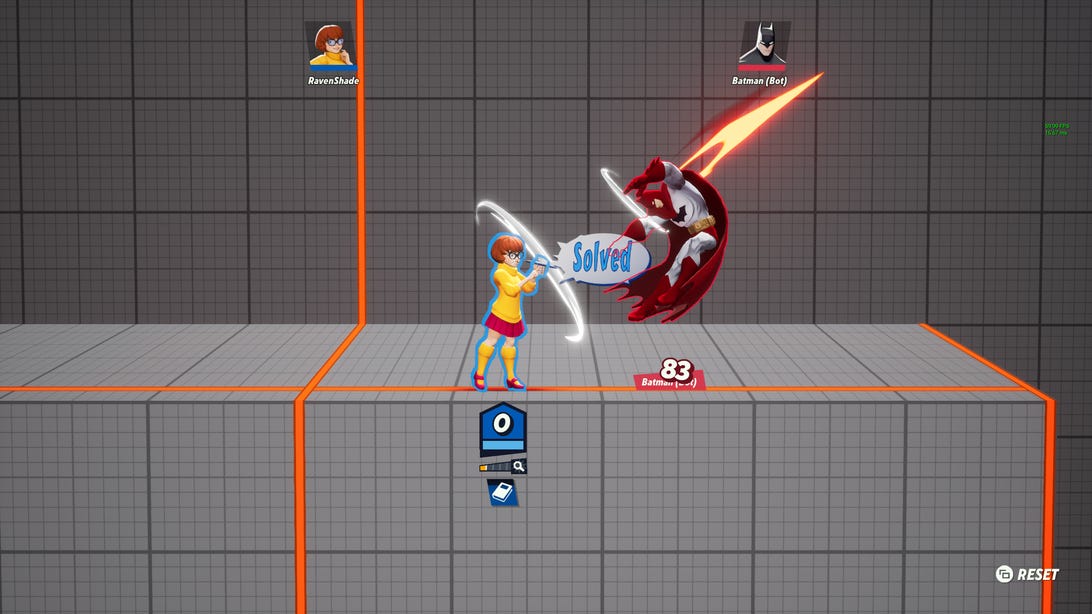
I've spent the past three days playing an early build of MultiVersus, the upcoming platform fighting game with characters like Batman, Bugs Bunny, Arya Stark from Game of Thrones and Shaggy from Scooby-Doo. I have no idea why these characters are fighting each other, but I want more of it.
MultiVersus is a hallucinogenic stew of Warner Bros. properties, which include HBO originals; classic and modern cartoons; and the DC side of superhero comics. If you can get over the absurdity of Arya teaming up with Tom & Jerry, there's a lot to like about the game. (And if you want to dive head-first into that absurdity, just check out the game's first cinematic trailer.)

After a game, you'll be given the option to rematch with your opponent in a best-of-3.
Screenshot/Adam BenjaminI approached MultiVersus skeptically. I'm a casual fighting game player at best, and I usually bounce off new fight games quickly because the mechanics and difficulty feel out of reach for me.
Instead, in less than a week, MultiVersus has made me want to get more into fighting games.
MultiVersus gameplay: Familiar, but fresh
The core gameplay of MultiVersus will feel familiar to anyone who's played Super Smash Bros. before. Fighters accumulate damage over the course of the match and the first team to knock opponents off the map four times wins. The more damage you deal to a player, the easier it is to knock them around the stage.
But matches of MultiVersus feel distinct from other platform fighters. For one, the boundaries of the map are clearly defined -- if you touch the zig-zagging black outline, you're knocked out. You know exactly how far you need to toss someone for a KO, which encourages players to aggressively move off the stage to secure knockouts.
Some character abilities also have cooldowns, meaning you have to wait a certain amount of time before you can use them again. Players have to be strategic about when they pull out those powerful moves so they're not on cooldown when you need them most.
MultiVersus also features character perks, small buffs that apply to you or your team. Players can use these perks to customize the way their characters play -- more aggressive, more resilient, etc.
All of these elements blend together to create a game that feels fun right out of the gate.

Players can equip one signature perk and three perks from among offense, defense and utility categories.
Screenshot/Adam BenjaminDeveloping for people from different universes
I talked to Chris White, CTO and Co-Founder of MultiVersus' developer Player First Games, on a Discord call. He spoke about the game with an earnest passion -- the same kind of passion that you'll pick up on in the fine details of the game's art and sound design. When White talked to me about the ideas and process behind the game, I saw that most of my experience in MultiVersus had been carefully crafted by the game's developers.
White said the game was crafted with newcomers and experienced fighting gamers in mind by aiming for a product that was easy to pick up and difficult to master.
For experienced players, White said, "I think the 2v2 experience if you're willing to give it a try is going to feel fresh and new," offering a new way to engage in the genre while still providing "tons of depth and tons of mastery." For players that were newer to the fighting genre or players who hadn't been able to get into fighters previously, the team at Player First tried to put together a game that would make people invested by removing barriers to the game and giving people a reason to stick with things by learning something every match.
In fact, that was my exact experience. After my first day playing the game, I couldn't stop thinking about character abilities and teamwork.
I've spent a dozen or so matches trying to determine the best use of Wonder Woman's Defense of the Gods ability, which cleanses debuffs and provides a shield to her and her ally at the cost of a fairly long cooldown. Do I pop it at the start of the match, allowing my team to get aggressive? Do I use it to cleanse? Or do I save it for high-danger situations, like when my teammate is at the edge of the stage and at risk of getting knocked out?

The icons below character damage represent abilities on cooldown.
Screenshot/Adam BenjaminThe ultimate answer is that it's situational, but every match gives me a little more information about those situations. I've been transfixed with that strategic element of the game -- how abilities and perks and team combinations all fit together. It adds layers to the longtime fighting game strategy of "What is my matchup against this character and how do I need to play as a result?"
White also said balance is important to the integrity and health of the game, and that the team at Player First Games was constantly balancing the game to make sure it doesn't feel stale and players don't end up in a situation where they feel like they have to pick one character in order to win. The developers look at win rates across different experience levels and combine that with other metrics like feedback from high-level players and internal tournaments to determine where they need to make changes.
"A whole new dimension to the fighting game scene"
The biggest challenge for MultiVersus will be standing out in a crowded genre with fans who are very loyal to their games. I asked White where he hoped MultiVersus would fit in and where he hoped it would stand out from that competition.
"One of the aspects we bring to the table is the cooperative team nature of the 2v2 gameplay," he said. "We believe that brings a whole new element to the fighting game genre of learning your ally, learning how to use synergistic moves with your allies," which adds an additional layer of strategy to fighting game mechanics. White hopes that 2v2 gameplay will expand and broaden the fighting game audience. Purists will still have the opportunity to fight 1v1, and chaos goblins can still enjoy four-player free-for-all matches. But MultiVersus is built around the core 2v2 game mode.
MultiVersus also has some creative approaches to gameplay that feel unique for a fighting game, which White said has been one of the best surprises during development. He cited Scooby-Doo's Velma as an example. In the cartoons, Velma is not a fighter. She's a diligent bookworm and observational genius. MultiVersus somehow finds a way to represent that in the game: Velma doesn't duel Batman with powerful jabs and roundhouse kicks. Instead, she uses her sass and her wit, bombarding him with chemistry, math and ideas. Along the way, she'll pick up clues, which will eventually let her solve the mystery of who's behind the mask and call the police to apprehend her opponent.

Creative character design helps MultiVersus stand out from other fighters.
Screenshot/Adam BenjaminIt's weird and fun and perfectly in character.
And still none of this truly conveys the absurd joy of MultiVersus. The weird satisfaction of Jake the Dog knocking out Superman and seeing "That's All, Folks!" pop up where the Man of Steel just perished. The unlikely pleasure of Velma pairing up with Batman to form a World's Greatest Detectives team. Everything about the game just clicks together with a surprising magnetism and left me reluctant to put the game down.
I entered a skeptic, but now I can't wait to see where we're going.









 Add Category
Add Category